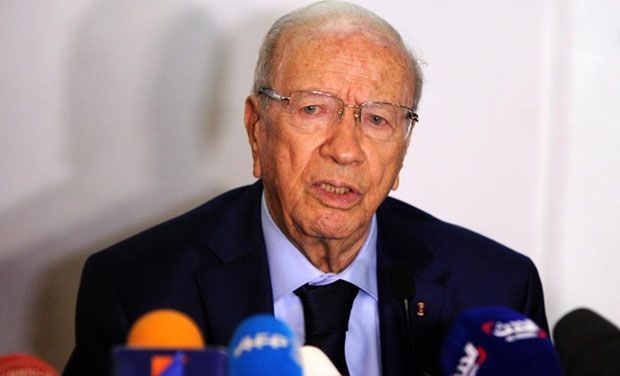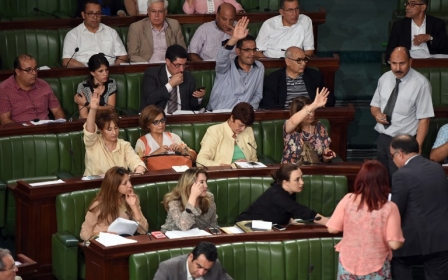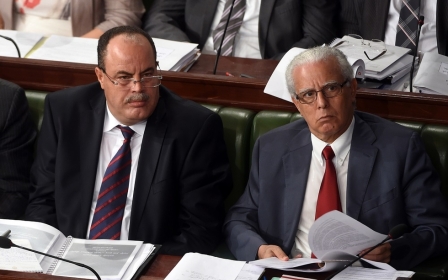Mass resignation of Tunisian MPs leaves Ennahda with majority

A group of 32 Tunisian MPs from the main party in a ruling coalition resigned on Sunday, upsetting the balance of power in the unity government.
The resignation of over a quarter of the 86 MPs from the Nidaa Tounes party leaves the Islamist-oriented Ennahda, previously the minor coalition party, with a parliamentary majority of 69 MPs to Nidaa Tounes’s 54.
Nidaa Tounes, whose founder Beiji Caid Essebsi is the country’s president, has been riven by infighting for months.
The MPs who resigned over the weekend support secretary general Mohsen Marzouk, who accuses Essebsi’s son Hafedh of trying to seize control of the party.
Seifeddine Ferjani, a researcher at the Round Table Studies, pointed out that the differences within Nidaa Tounes were too strong to remain united.
"First of all, they couldn’t help but fragment, because they are not really a single political bloc," he said. "They came in as a rescue party that represents the continuity of the independent modernist project."
The 32 MPs suspended their membership of Nidaa Tounes last week after alleging that Essebsi supporters had come to a meeting of the party’s executive committee armed with sticks and blocked rival party members from entering.
One of the group, Abeda Kefi, told a press conference at the time that they were “not seeking to divide the party,” but claimed that the party’s structures had been “broken by a desire to carry out a putsch” in favour of the president's son.
The rift reflects the personality politics within the party, with members split between support for Mohsen Marzouk and the deputy chairman Hafedh. Essebsi faces accusations by Marzouk's supporters that he is priming Hafedh to take over his position.
Ferjani said that supporters of Nidaa Tounes, who are made up of "cultural leftists" and remnants of the Ben Ali regime, are not ideologically inclined, and are looking for upper level positions and influence.
The party, Ferjani maintained, was created as a reaction to Ennahda's power, which won elections in October 2011 and were in charge of rewriting the country's constitution, appointing a president and forming a caretaker government. Many Tunisians were afraid of having an Islamist party as the majority in the government, while others saw Ennahda as an outsider project.
"When Nidaa Tounes allied itself with Ennahda it created a huge existential problem for the project itself," Ferjani said. "A lot of people were attracted to the project because it was anti-Ennahda. When that didn’t go to plan it started to create other problems. Nidaa Tounes supporters expected something back: protection, influence, continuation of monopolies and protection of contracts. That’s not happening."
Monica Marks, a visiting fellow for the European Council on Foreign Relations (ECFR), believes that it is too early to determine whether the resignation of the 32 MPs will affect the political stability in the country.
"Nidaa never behaved as an organised bloc in parliament," she said. "Much remains to be seen, however, given then internal conflicts in Nidaa as a whole and the differences of political opinion and background in the bloc of the 32 MPs.
"Twists, turns, and internecine conflict have been par for the course in Nidaa, so surprises are still very possible."
Fadil Aliriza, a journalist and analyst, agrees that the resignations will "likely avoid rocking the boat too much".
"First, the Nidaa Tounes party still controls the presidency and has powerful allies in the media and business sectors," Aliriza explained. "Second, all attention is on Nidaa right now, its weaknesses as a party and what, if anything, unifies the party ideologically. Since the original glue that held Nidaa Tounes together was an anti-Ennahdha stance, Ennahdha will benefit from not making the story about itself right now."
The MPs will hold a press conference on Monday afternoon to address their mass resignation.
New MEE newsletter: Jerusalem Dispatch
Sign up to get the latest insights and analysis on Israel-Palestine, alongside Turkey Unpacked and other MEE newsletters
Middle East Eye delivers independent and unrivalled coverage and analysis of the Middle East, North Africa and beyond. To learn more about republishing this content and the associated fees, please fill out this form. More about MEE can be found here.




